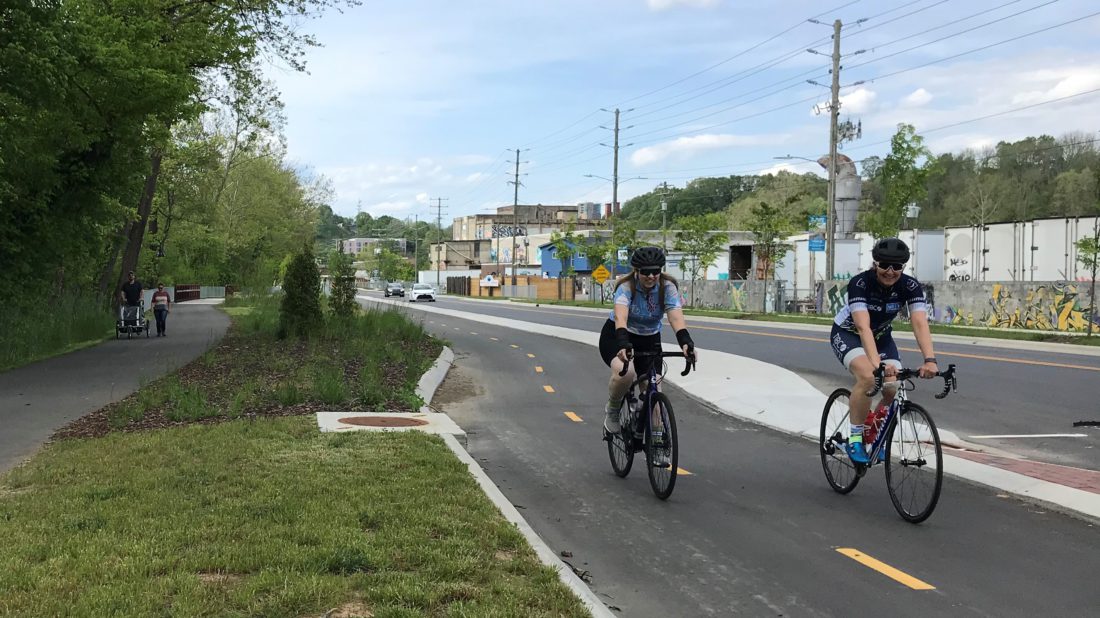When it comes to breaking news, infrastructure typically is not the first thing that comes to mind. However, Asheville’s infrastructure took local news by storm this year with several hot-button issues and controversial proposals.
Asheville’s aging water system was the first piece of infrastructure that took the spotlight in 2023, with thousands of Asheville residents ringing in the new year without water after a cold snap led to multiple breaks and failures across the city’s water system.
Later in the year, the addition of bike lines on Merrimon Avenue divided the community. Some argued the lanes would improve safety for cyclists and pedestrians, while others worried traffic snarls would put a strain on the thoroughfare’s businesses.
Here’s what developers, government officials, activists and residents thought about those topics and others.

What lessons did the City of Asheville learn from the water outage, and has it made progress in addressing a future water service issue?
“After the outage, the City Council created an Independent Review Committee (IRC) to review and provide a comprehensive account of the water outage, including an assessment of the operational and emergency response, communication efforts and needed infrastructure improvements. Since then, the Water Resources Department has either implemented or is in the process of implementing the IRC’s recommendations per the city’s duty to provide safe, clean water to our customers.” — Esther Manheimer, Asheville mayor
“First, let’s recognize the city workers who committed themselves over the holiday week to fix the problem. However, in addition to our aging infrastructure, Asheville has a communication problem. During the water crisis, critical areas like the hospital were prioritized, but that was not communicated to the community, which was rightfully upset and disillusioned by the city’s response.” — Lissa Pedersen, teacher and vice president, Buncombe County Association of Educators
“From the outside, it looks like they [are] taking it seriously with the postmortem review that the city conducted. I have seen more underground utility work around town, so I imagine that [the city] is working toward a more sustainable water system with more dependable service.” — Billy Doubraski, East West Asheville Neighborhood Association board member
“The water outage was terrible for so many families and businesses, and the city has taken it very seriously. Since the water outage, we’ve invested in the Mills River Treatment Plant to fortify against extreme weather, established communication protocols to better share information with the community and updated our Emergency Management Plan to improve [our] coordinated response.” — Maggie Ullman, Asheville city council member
Were this year’s infrastructure priorities correct? Or should we have focused elsewhere? Examples from this year include Merrimon Avenue and McCormick Field.
“I honestly don’t think the mess that was made of Merrimon Avenue and the time it took to complete the project was worth it. I am, however, grateful for the steps taken to ensure that the Asheville Tourists remain the Asheville Tourists. Much can be argued about the importance of safeguarding the things that make Asheville what it is. Our baseball team and field are a part of that. Simple to some, but as an 11-year resident here, this matters to me.” — Ashanti Ternoir, community member and service provider
“The infrastructure that’s most impactful on our community is our stormwater system, especially given our mountainous topography. It not only feeds into our waterways, but when it malfunctions, it can cause substantial damage. I’m the thankful for the city’s commitment to addressing these issues through its 10-year plan, notably in areas like Biltmore Village. I was also happy with the Merrimon Road improvement. It’s safer for cars and pedestrians now, which will save lives and money.” — David Moritz, developer, Mori Blue Holdings LLC
“The Merrimon Avenue project, while controversial, has been a huge success. It has made Asheville a friendlier, safer and more accessible place to live. It’s a great model for how we can design cities for people instead of cars. As safety data continues to come in and people get used to the change, the value of the project will be clear to all. The top infrastructure need for Asheville, however, is more housing options. Local governments and our whole community need to be dedicated to solving the housing crisis, not only so people who live here now can afford to stay, but also to make room for the huge numbers of climate-change refugees that will be relocating here in the coming years.” — Josh Kelly, public lands biologist, MountainTrue
“Supporting McCormick Field was a big mistake. The economics of supporting a minor league team are horrendous, and this investment will not pay for itself over time. At best, it’s a bid for nostalgia by paying to keep a minor league team here instead of having an independent team play here. At worst, it’s a huge subsidy to $2 billion-dollar businesses, the Houston Astros and Major League Baseball.” — Andrew Celwyn, former board member, Buncombe County Tourism Development Authority
“’Correct’ probably isn’t the right word, but they’re certainly defensible. I live in North Asheville and am slowed every day by the Merrimon Avenue ‘road diet’ and have never once decried it. It makes our city more livable, and I’m hoping the city does a better job of connecting multimodal streets to encourage more bike commuting. McCormick Field, on the surface, was a giveaway to a billionaire team owner, but if this means the field will now be open to year-round use for concerts and other events outside of baseball season, this could be a huge and much-needed addition to Asheville’s cultural and entertainment venues.” — Matt Peiken, host, The Overlook with Matt Peiken
“I drive Merrimon every day. Initially, with the lane changes that were made, I felt there was just too much traffic for one lane, but I have changed my tune! I think it has made a big difference in the safety of drivers, cyclists, even walkers, in the North Asheville area. Hats off on that one.” — Monica Walsh Blankenship, veteran
What’s the biggest infrastructure need for your neighborhood that you’ve noticed this year? (Please include the name of the area where you live.)
“I live on South French Broad Avenue and I walk a lot, so from my perspective, the biggest infrastructure needs are sidewalks, trees, benches and trash cans. Many of our sidewalks are crumbling, and/or have poor drainage. Lots of the trees lining the streets have died or are dying, so there’s less shade each year. Benches would be nice to rest on, and trash cans would cut down on litter.” — Stu Helm, food blogger and food tour guide, Stu Helm Food Fan
“Our office is located in the Pisgah View Apartments community in West Asheville, a property of the Housing Authority of the City of Asheville. One of the largest infrastructure needs we see where we work includes better transit opportunities for community members to access jobs, grocery stores and health care. Without a car, team members require additional hours of transit time on a city bus to reach the office, pick up lunch and visit program sites.” — Ashley Allen, co-executive director, Read to Succeed Asheville/Buncombe
“Believe it or not, only one major apartment building was built in North Asheville over the past 10 years. That’s because our zoning laws are outdated. On Merrimon, for example, where we have two bus lines, you can only build a fast-food joint because of the two-story height limit, 6,000-square-foot floor plan limit and parking requirements. How are we going to provide people with somewhere to live, especially in areas near amenities and transit, if we can’t build?” — David Moritz
“I live in West Asheville next to Pisgah View Apartments. It’s saddening to see the homeless population surrounded by the low-income housing development. They were camping in the woods, and the [Asheville] Police Department tore down the surrounding bushes. A lot of them suffer from addiction, so I’d like to see facilities in Asheville that can help people get off the streets if they decide to do so themselves.” — Nina Gi, singer-songwriter
How have changes in the real estate market impacted you this year?
“The challenge of unaffordable housing continues with rising interest rates and housing prices. My friends and neighbors are struggling to afford to live here with rising rents, and homeownership is less and less accessible. The lack of housing also creates an environment where many of our neighbors can’t afford housing at all. I am saddened to see our city criminalizing folks for not being able to afford our extremely expensive city.” — Grace Barron-Martinez, activist and realtor
“This year, I was forced to move out of my rental home because it was put on the market for sale. As I start the new year, I also will be looking for a new place to live. With rental prices astronomically high, and a dog, the search has been tiresome and quite difficult.” — Karis Roberts, executive director, Asheville Brewers Alliance
“The increase in construction costs and interest rates have greatly impacted housing development, especially affordable housing. Our community has a great need for housing units for multiple income groups. Slowing housing production means higher rents for everyone, which impacts lower-income families the most. Also, with increased costs, developers and builders look to both the city and the county for more funding to make it feasible to build affordable housing.” —Sasha Vrtunski, Affordable housing officer, City of Asheville
“I’ve been a homeowner in Buncombe County for almost 30 years. I see the reward of additional wealth from a strong real estate market, and in my professional life, I see the challenges that come with that. I welcome the appreciation in my property value due to current market conditions. However, I also realize that my adult children may find it difficult to purchase that first home due to the same conditions.” — Keith Miller, tax assessor, Buncombe County
“Remote work has changed the landscape of real estate. People can choose where they want to live without sacrificing the money that they make. Remote workers are willing to spend more on a house based on their financial situation. The resulting increase in local cost of housing is a strain on people that live off of local market wages.” — Lucious Wilson, board member, Buncombe County Tourism Development Authority




Before you comment
The comments section is here to provide a platform for civil dialogue on the issues we face together as a local community. Xpress is committed to offering this platform for all voices, but when the tone of the discussion gets nasty or strays off topic, we believe many people choose not to participate. Xpress editors are determined to moderate comments to ensure a constructive interchange is maintained. All comments judged not to be in keeping with the spirit of civil discourse will be removed and repeat violators will be banned. See here for our terms of service. Thank you for being part of this effort to promote respectful discussion.